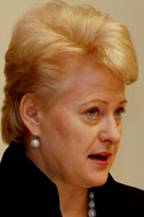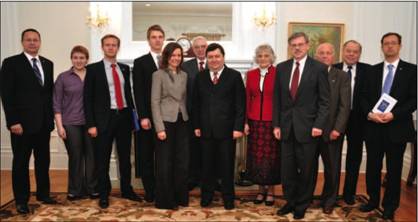The President and the World-Lithuanians on collision course?
 Dalia Grybauskaite, President of the Republic of Lithuania |
 Regina Narusiene, President of the World Lithuanian Community |
REGINA NARUSIENE: “The majority, I believe, are disappointed and discouraged with the present president’s seemingly unfriendly view toward Lithuanian-Americans and others abroad.”
The Baltic Times writes that Lithuanian President Grybauskaite is supposedly “disappointed by Lithuanian emigres’ inability to attract U.S.-based investments to Lithuania.” The newspaper refers to a WikiLeaks document.
According to WikiLeaks, Grybauskaite emphasizes that most prominent U.S. Lithuanian emigres, instead of focusing on developing U.S.- Lithuanian business ties, prefer providing political advice to the Lithuanian authorities, which may not be that necessary nowadays.
In a response to The Baltic Times, Regina Narusiene, President of the World Lithuanian Community, says that “The majority of Lithuanian-Americans are disappointed with Grybauskaite.”
“How do Lithuanian-Americans’ views generally differ on the former U.S.-much-linked President Valdas Adamkus and his successor, Dalia Grybauskaite? Which is favored?,” the newspaper asks Narusiene.
And she answers: “There are different points of view. Some favor President Adamkus, but the majority, I believe, are disappointed and discouraged with the present president’s seemingly unfriendly view toward Lithuanian Americans and others abroad.”
“There is the tendency of some Lithuanian politicians to think that “Lithuania belongs to the Lithuanians.” By that they mean those living in Lithuania only. The people of Lithuania have a more favorable view of Lithuanians living abroad.”
“The Lithuanians abroad have brought many investments to Lithuania. However, I want to emphasize, Lithuania has been having a difficult time setting an investment climate competitive with other countries.”
“Collaboration can have different meanings. Our private ties with the country after independence never diminished, but, in fact, intensified. Economic ties are different. A great deal of money is sent to Lithuania by Lithuanians abroad, especially to their family and friends. I believe an amount equal to about 20 percent of Lithuania’s annual national budget. Some firms have located in Lithuania, but Lithuania has to maintain an inviting environment for investment, which they are developing. Cultural collaboration, however, I admit, has been weak. There is a Lithuanian opera in Chicago that has been collaborating with the Lithuanian National Opera and Ballet Theater. We have participated in the Dance Festivals in Lithuania and sent works of art to Lithuania. Some of the entertainers from Lithuania have come to us to entertain, but working out joint programs has been difficult.”
“Can you think of any cases when Lithuanian emigres cut off their ties with the Motherland because of the lack of the political will to adopt a dual-citizenship law?,” Baltic Times asks.
“There are a number of new emigres who have simply said, “I can do better and live more securely abroad. If they do not want us, then why bother.” Unfortunately, these are well educated young people that Lithuania cannot afford to lose. In several instances, the taking away of Lithuanian citizenship has forced some to keep foreign citizenship so as not to lose their means of support, their pension.”
Ref: http://www.baltictimes.com/news/articles/28875/
* * *
Around half of all Lithuanians in the world live outside their home country. They represent a human resource Lithuania desperately needs to get the country back on its feet again after 50 years of bloody wars, genocides, deportations, Soviet opression and now two decades with much muddle and confusion instead of professional focus on collaboration and team work among its own populations here and abroad.
I suggest that the president now reaches out and invites all Lithuanians, and friends of this country around the world, to a close and constructive cooperation. A continued conflict is truly meaningless and devastating.
Aage Myhre, Editor-in-Chief
Lithuania would benefit significantly by availing itself of the expertise and knowledge found in the Diaspora communities

Lithuanian American Council (LAC) Delegation in Conference at Lithuania’s Embassy (LE) in Washington, D.C. with Ambassador Žygimantas Pavilionis, and Emanuelis Zingeris from the Lithuanian Parliament
A delegation representing the Lithuanian American Council (LAC) was recently received at the Lithuanian Embassy in Washington D.C., where it met with the Chairman of the Foreign Affairs Committee of the Lithuania’s Parliament, Emanuelis Zingeris and Lithuania’s Ambassador to the United States, Zygimantas Pavilionis.
In the course of the meeting LAC representatives expressed their concern on a wide range of topics including Lithuania’s developing energy policy, the country’s image in the international community, emigration issues and their demographic impact, the prospect of maintaining citizenship rights of recent immigrants, ongoing cooperation between organizations of the Diaspora and Lithuania, and minority issues in Lithuania. LAC representatives suggested that Lithuania would benefit significantly by availing itself of the expertise and knowledge found in the Diaspora communities in developing energy and security policies and a host of other areas such as environmental issues, ecology, medicine, economic development, and the promotion of improved interactions between the government and the people through non-governmental organizations.